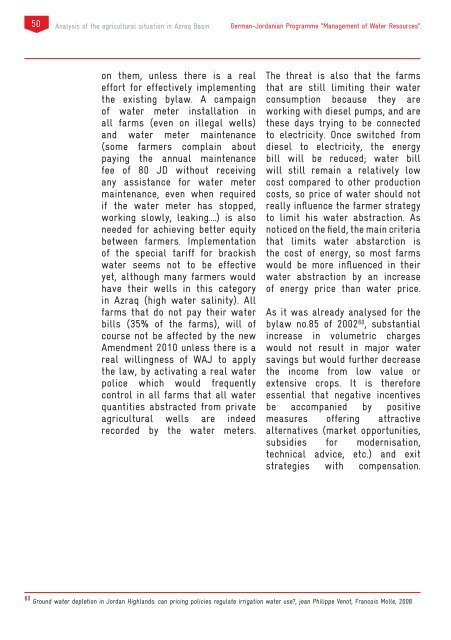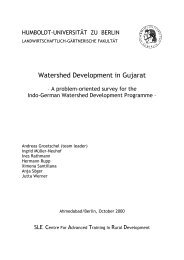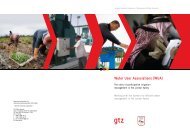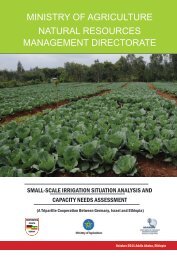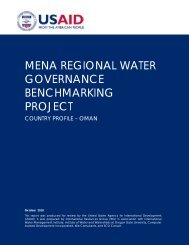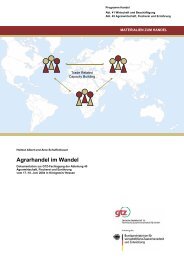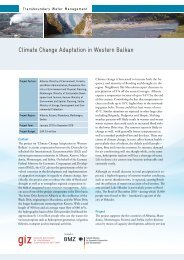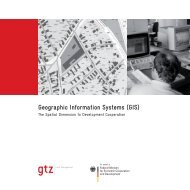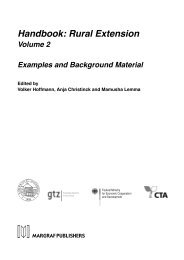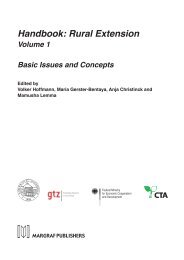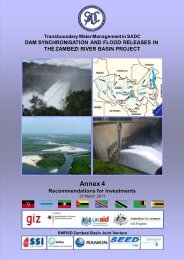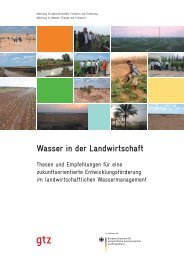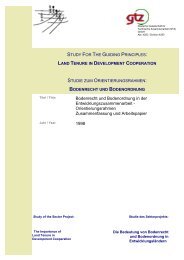Farming in the - WordPress.com
Farming in the - WordPress.com
Farming in the - WordPress.com
You also want an ePaper? Increase the reach of your titles
YUMPU automatically turns print PDFs into web optimized ePapers that Google loves.
50<br />
Analysis of <strong>the</strong> agricultural situation <strong>in</strong> Azraq Bas<strong>in</strong><br />
German-Jordanian Programme “Management of Water Resources”<br />
on <strong>the</strong>m, unless <strong>the</strong>re is a real<br />
effort for effectively implement<strong>in</strong>g<br />
<strong>the</strong> exist<strong>in</strong>g bylaw. A campaign<br />
of water meter <strong>in</strong>stallation <strong>in</strong><br />
all farms (even on illegal wells)<br />
and water meter ma<strong>in</strong>tenance<br />
(some farmers <strong>com</strong>pla<strong>in</strong> about<br />
pay<strong>in</strong>g <strong>the</strong> annual ma<strong>in</strong>tenance<br />
fee of 80 JD without receiv<strong>in</strong>g<br />
any assistance for water meter<br />
ma<strong>in</strong>tenance, even when required<br />
if <strong>the</strong> water meter has stopped,<br />
work<strong>in</strong>g slowly, leak<strong>in</strong>g….) is also<br />
needed for achiev<strong>in</strong>g better equity<br />
between farmers. Implementation<br />
of <strong>the</strong> special tariff for brackish<br />
water seems not to be effective<br />
yet, although many farmers would<br />
have <strong>the</strong>ir wells <strong>in</strong> this category<br />
<strong>in</strong> Azraq (high water sal<strong>in</strong>ity). All<br />
farms that do not pay <strong>the</strong>ir water<br />
bills (35% of <strong>the</strong> farms), will of<br />
course not be affected by <strong>the</strong> new<br />
Amendment 2010 unless <strong>the</strong>re is a<br />
real will<strong>in</strong>gness of WAJ to apply<br />
<strong>the</strong> law, by activat<strong>in</strong>g a real water<br />
police which would frequently<br />
control <strong>in</strong> all farms that all water<br />
quantities abstracted from private<br />
agricultural wells are <strong>in</strong>deed<br />
recorded by <strong>the</strong> water meters.<br />
The threat is also that <strong>the</strong> farms<br />
that are still limit<strong>in</strong>g <strong>the</strong>ir water<br />
consumption because <strong>the</strong>y are<br />
work<strong>in</strong>g with diesel pumps, and are<br />
<strong>the</strong>se days try<strong>in</strong>g to be connected<br />
to electricity. Once switched from<br />
diesel to electricity, <strong>the</strong> energy<br />
bill will be reduced; water bill<br />
will still rema<strong>in</strong> a relatively low<br />
cost <strong>com</strong>pared to o<strong>the</strong>r production<br />
costs, so price of water should not<br />
really <strong>in</strong>fluence <strong>the</strong> farmer strategy<br />
to limit his water abstraction. As<br />
noticed on <strong>the</strong> field, <strong>the</strong> ma<strong>in</strong> criteria<br />
that limits water abstarction is<br />
<strong>the</strong> cost of energy, so most farms<br />
would be more <strong>in</strong>fluenced <strong>in</strong> <strong>the</strong>ir<br />
water abstraction by an <strong>in</strong>crease<br />
of energy price than water price.<br />
As it was already analysed for <strong>the</strong><br />
bylaw no.85 of 2002 60 , substantial<br />
<strong>in</strong>crease <strong>in</strong> volumetric charges<br />
would not result <strong>in</strong> major water<br />
sav<strong>in</strong>gs but would fur<strong>the</strong>r decrease<br />
<strong>the</strong> <strong>in</strong><strong>com</strong>e from low value or<br />
extensive crops. It is <strong>the</strong>refore<br />
essential that negative <strong>in</strong>centives<br />
be ac<strong>com</strong>panied by positive<br />
measures offer<strong>in</strong>g attractive<br />
alternatives (market opportunities,<br />
subsidies for modernisation,<br />
technical advice, etc.) and exit<br />
strategies with <strong>com</strong>pensation.<br />
60 Ground water depletion <strong>in</strong> Jordan Highlands: can pric<strong>in</strong>g policies regulate irrigation water use?, jean Philippe Venot, Francois Molle, 2008


